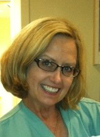|
By
Dede Bearden
Public Relations
Teamwork
and innovative thinking make the
echocardiography lab at MUSC one
of the best in the Southeast for
detecting and monitoring heart
disease.
 Adell Bell Adell Bell
However,
clinical manager Adell Bell, who
retired in December, was another
key to the lab's reputation and
success.
Bell came to work as a cardiac
sonographer for medical director
Bruce Usher, M.D., in November
1979. She became the only
sonographer when
echocardiography was advancing
rapidly. She often worked
10-hour days while attending
night school at Charleston
Southern to receive her Bachelor
of Science in Business
Administration. Bell led the
department through years of
technological advancements,
hiring and training more than 30
sonographers.
According
to Usher, for more than 30
years, Bell was passionate about
making a difference in patients'
treatments, often working extra
hours to make that happen. She
insisted that those working
under her give great respect to
their patients, and over the
course of her career, she
assisted in the lab expanding to
its current size.
"She has
always taken great pride in the
echo labs at MUSC," said Usher.
"Through her efforts, the lab
expanded to our current level of
sonographers and the number of
studies performed increased to
over 10,000 procedures."
Bell also
helped plan the labs in Ashley
River Tower (ART), and she aided
the smooth transition into the
facility.
After working in the adult echo
lab from 1979-2008, Bell became
the clinical manager for the
non-invasive cardiovascular
diagnostic services, the echo
lab, and the vascular and EKG
lab.
As
clinical manager, Bell assisted
the technical and scheduling
staff with the flow of patients
in and out of labs. These labs
included three labs on the first
floor of ART, two labs on the
third floor, and three labs on
the sixth floor. On a daily
basis, she communicated with the
echo supervisor and staff
members.
Bell
retired after 32 years at MUSC,
having earned her Master of
Healthcare Administration and
organized local and state
continuing echo programs. She
also organized echo conferences
with the Bowman Gray School of
Medicine.
The aspect of her career that
Bell will miss most is learning
and teaching new techniques. She
was always excited to make
advancements for heart patients.
"Just
when you think, 'what can they
come up with next?' the
engineers, researchers, Ph.D.s
and cardiologists band together
and create a new modality to
help diagnose and treat heart
disease," she said.
Usher
said the lab wouldn't be what it
is today without her personal
dedication.
"She was
an ambassador for MUSC," he
said. "She loved MUSC and
echocardiography, and she will
be greatly missed, not only by
myself and the cardiology
division, but by all of MUSC."
|



 Adell Bell
Adell Bell